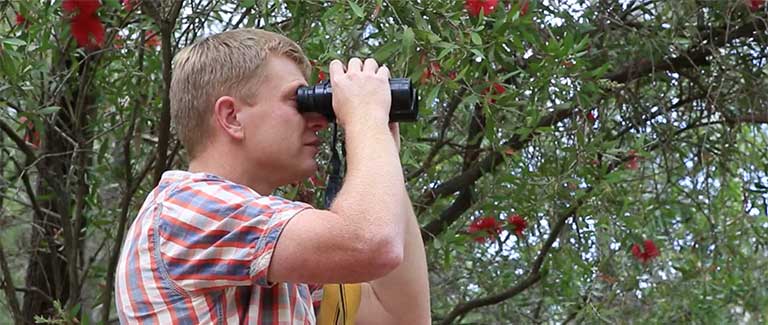Zoology
Zoology is the science of studying and understanding animals living on land, in freshwater or in the sea. It is the branch of biology that covers behaviour, classification, evolution, conservation, distribution, ecology and natural history, but also includes biochemistry and physiology, palaeontology, molecular biology and genetics, and the structure and function of animals.
Our mission
1. to provide students with a thorough knowledge of the diversity of the animal kingdom and an understanding of how that diversity arose through a research– led and –informed curriculum;
2. to enable students to graduate with practical laboratory and fieldwork skills, critical problem solving skills, and excellent communication skills;
3. to harness the unique attributes of UNE's location nationally and internationally and access to a unique fauna, unmatched online education experience, and above-world class research credentials to provide undergraduate students with a holistic education within zoology;
4. to prepare students for further study or employment across the wide range of disciplines within which zoology is critical; provide broad understanding of zoology for students who do not aspire to continue with employment in the area;
5. to instill students with an appreciation of the many facets that make up zoological sciences.
Why Study Zoology at UNE?
We are the only Bachelor of Zoology in Australia.
This degree focuses on a wide range of issues dealing with the biology of animals. It includes material on the internal functioning of animals (physiology) and the role of animals in their environment (ecology).
The Bachelor of Zoology allows graduates to take up a wide range of careers - to help you decide which units might best fit your desired pathway, consult the suggested course plans. If you are still unsure, then please contact the BZool Course Co-ordinator via zoology@une.edu.au for more detailed advice.
Our staff have expertise in many fields of zoology and animal ecology. This includes physiology, behaviour and ecology of native animals and how these enable adaptation to the environment: leading to a greater understanding of the structure and function of Australian communities.
Zoology students are able to undertake studies in a range of zoological disciplines including:
- environmental and comparative physiology
- entomology
- marine ecology
- freshwater ecology
- animal behaviour
- animal ecology
- parasitology
UNE is the perfect location to study animals. Within two hours drive of Armidale we have: sub-alpine to sub-tropical climates; semi-arid savannah to rainforest; biodiversity hotspots and world heritage national parks; most major soil types; western and eastern river drainage systems; and estuarine and marine environments making UNE an ideal which are ideal location for zoological studies.
Bachelor of Arts/Bachelor of Science Bachelor of Science with Honours Graduate Certificate in Environmental Science Doctor of Philosophy BIOL110 - Biology I Zoologists study life at the level of the organism, population, community, and/or ecosystem. Ecologists, physiologists, taxonomists, parasitologists, entomologists, and wildlife biologists, are a few examples of zoologists. Zoologists can be included in all aspects of research, As a Zoologist you could work on: Are you considering Honours in Zoology? See information on School of Environmental and Rural Science Honours Programs. Visit Scholarships for more information about scholarship opportunities. For information on our research activities, please visit the pages of the following research groups at UNE:Undergraduate
Bachelor of Environmental Science
Bachelor of Science
Bachelor of Science/Bachelor of Laws
Bachelor of Zoology
Diploma in The SciencesBachelor Honours
Postgraduate Coursework
Graduate Diploma in Science
Master of Environmental Science and Management
Master of Scientific StudiesPostgraduate Research
Master of Environmental Science (Research)
Master of Science
BIOL120 - Biology II
CHEM110 - Chemistry I
CHEM120 - Chemistry II
ECOL100 - Ecology: Concepts and Applications
EVOL211 - Evolution and Biogeography
MTHS110 - Quantitative Skills with Applications
MTHS120 - Calculus and Linear Algebra 1
STAT100 - Introduction to Statistical Modelling
ZOOL100 - Principles of Zoology
ZOOL203 - Vertebrate Zoology - Evolution and Diversity
ZOOL210/410 - Invertebrate Zoology
ZOOL326/ 526 - Animal Behaviour
ZOOL327 - Ecological and Comparative Physiology
ZOOL329/ 529 - Evolutionary Parasitology
ERS501 - Applied Research Skills in Environmental and Rural Science
SCI500 - Research Methods in the Sciences
conservation, and management of populations. Examples of potential employers of UNE Zoology graduates include:
Contacts
For existing BZool student queries regarding your course
Please email BZool Course Coordinator Assoc. Prof. Karl Vernes
For general and administrative enquiries, AskUNE.
For further information about studying Zoology at UNE:
Zoology
Phone: +61 2 6773 2340
Fax: +61 2 6773 3283
Email: zoology@une.edu.au


